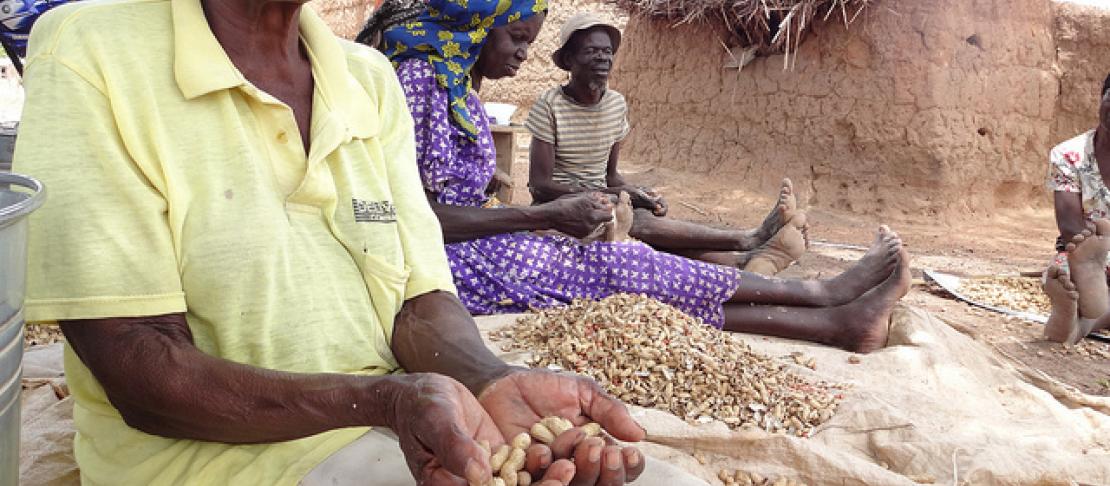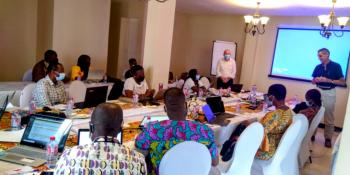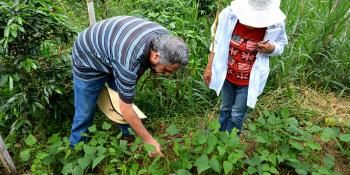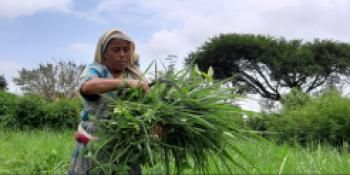In Ghana, reduced vulnerability for those that garden together

As the charismatic secretary for the Blind and Disabled group’s dry season garden in Dazuuri village, Upper West, Ghana, Claire would know better than anybody the value of group association for improving the adaptive capacity of vulnerable individuals to climate change impacts.
Ongoing research from the CGIAR Research Program on Climate Change, Agriculture and Food Security (CCAFS) is examining how the adoption of climate-smart practices—i.e. those that promote adaptation to climate change and food security goals while being mindful of mitigation—can be facilitated, and what obstacles might stand in the way. Dry season gardening is one of these practices, and it is starting to catch on in Dazuuri village.
“Let me tell you about the history of our group,” Claire says. Sitting among her fellow group members and busily employed in Ghana’s national pastime of groundnut shelling, she starts to weave a remarkable narrative.
“Our group as you see it here had nothing going for us in past years,” she says. “We used to just gather in the community center and crack groundnuts for people at a fee; it was all people expected us to be able to do.”
Then, a member whose son attended school in Bolgatanga learned about disabled individuals in the Upper East region of Ghana who had started a gardening group to support themselves. “The boy saw the need for something similar here,” Claire explains, “and when he came back he told us how we should not just limit ourselves to cracking groundnuts. So we put ourselves into a group and started gardening.”
“We were not gardeners before this…”
Elderly and disabled people in rural, agricultural communities are some of the most harshly affected by the negative impacts of climate change, and some of the most disadvantaged when it comes to the acquisition of climate-smart practices, technologies and information. But, says Claire, being a part of a group changes everything.
Firstly, there is fulfillment in belonging to a group. “If you live in isolation,” she says, “you seem like a selfish or inward looking person. But look at the work we are doing here. It would take a long time if you were alone, but the fact that we are doing it together shows a lot of love and makes the work go faster and better.”
Then, there are the opportunities to learn from fellow group members. Claire asserts, “On your own, there are things that you will not just take the initiative to do. But when you are in a group, and somebody does one thing, you see the results straight away. All the things we know are things we learned after coming together as a group. We were not gardeners before this.”
Most important, perhaps, is the increased clout that group status lends to its members. Now that they are organized, they can establish links with other institutions and avenues of support. “Some NGO may come and go and we are unaware of what that interaction will lead to,” says Claire. “But that NGO goes and shares the ideas that they have heard about our group with another organization, and that new organization may think ‘oh, I heard of you through this organization that you worked with so now I am also coming to know about you.’”
Before you know it, she continues, help is coming out of the interaction that they didn’t even ask for - and would never have gotten if they had been acting as individuals.
A group is greater than the sum of its parts
Claire’s final point is perhaps the most instructive of her entire account: The level of organization of community members and their contact with external support systems can have a huge effect on whether climate-smart practices are adopted, and, by extension, on food security and capacity to adapt to climate impacts.
“Disabled people can also contribute to the development of society,” asserts Claire, with a punch of her trademark confidence. “Look at us here—the fact that we are disabled people and yet have been able to come together to support ourselves, that alone is enough to influence policy makers to take a second look at assumptions about us.” Her groundnut-shelling companions nod forcibly in agreement, smiling proudly.
Read more about CCAFS work on climate-smart agriculture:
What’s so smart about climate-smart agriculture?
Climate-smart villages in India show early signs of great reform achievements
Smart made even smarter: Gender addressed in new brief on climate-smart agriculture
See related posts by Caity Peterson on the Thomson Reuters Foundation blog:
Vegetables for Ghana's vulnerable
Fast growing groundnuts keep Ghana's farmers afloat amid climate shifts
What women farmers want to know
Caity Peterson is a visiting researcher and science writer based at the Center for International Tropical Agriculture (CIAT) in Cali, Colombia, working on CCAFS Theme 1: Adaptation to Progressive Climate Change.



